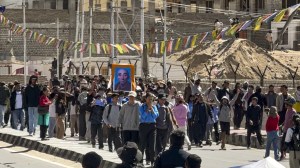Ban triple talaq, spread literacy: NCW report on Muslim women
NEW DELHI, APRIL 9: I am 18 years old. I have five children. One year ago, I was given talaq (divorce). No mehr, no maintenance. I cook at...

NEW DELHI, APRIL 9: I am 18 years old. I have five children. One year ago, I was given talaq (divorce). No mehr, no maintenance. I cook at people’s houses — Shakira Sultana.
* "I have four children. My husband Taufiq has remarried and gone away with his second wife. I have no means of support" — Najma.
* "I was married in 1996 and divorced two months ago. My husband used to beat me over small things. One day, when we were at my aunt’s home, as he was going out, he turned around and told me, "Talaq, talaq, talaq" — Almas.
These and countless such testimonies recorded during nation-wide public hearings by the National Commission for Women (NCW) over the past 18 months, are contained in the first-ever national status report on the condition of Muslim women released by the NCW last week.
Entitled `Voice Of The Voiceless’, the report authored by NCW member Syeda Hameed, lays bare the double exploitation suffered by Muslim women in India. On the one hand, their educational and employment status is among the lowest in the country and on the other, they are denied their rightful due under the Muslim Personal Law, either through misinterpretation of the law by the conservative sections or through ignorance of their rights.
"We want to hold up a mirror to the Muslim society and jolt the enlightened sections into doing something about the injustice done to often poor and illiterate women in the name of the personal law," Hameed said.
In major recommendations forwarded to the Centre, the NCW has advocated immediate banning of the verbal triple talaq, stringent provisions to curb polygamy and measures to correct the "injustice" done to Muslim women by the 1986 Muslim Women (Protection Of Rights On Divorce) Act.
Describing the educational status of Muslim women as among the worst in the country, with even Dalit women doing better, the NCW has called for imparting education and creating awareness on a war footing.
"In hearing after hearing, the Commission observed that the abuses of personal law and bruises of family violence are ultimately rooted in their (women’s) lack of education. No education and widespread ignorance has made them blind to the abuse of their personal laws which are used as instruments of torture rather than as celebration of their rights," said Hameed in the report.
Stressing the need to reform the implementation of the Personal Law, the report noted that while several Muslim countries had moved to prohibit or restrict verbal triple talaq, the practice continued unabated.





- 01
- 02
- 03
- 04
- 05


























